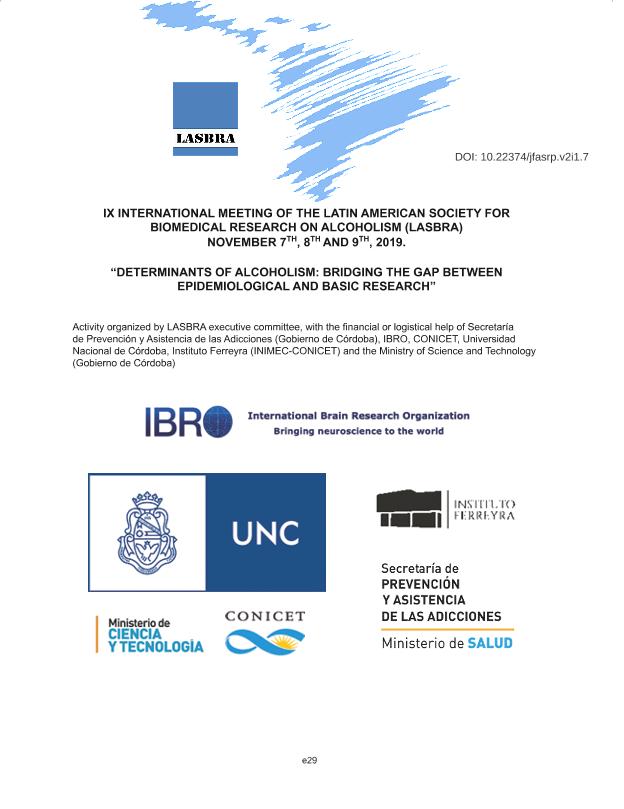Evento
ELSA cohort 2014: Acute Alcohol Effect on Inhibitory Control, Reward Sensitivity and Risk Taking in College Students with High and Low Trait Impulsivity
Tipo del evento:
Reunión
Nombre del evento:
IX International Meeting of the Latin American Society for Biomedical Research on Alcoholism (LASBRA)
Fecha del evento:
07/11/2019
Institución Organizadora:
Latin American Society for Biomedical Research on Alcoholism;
Título de la revista:
Journal of Fetal Alcohol Spectrum Disorder
Editorial:
Dougmar Publishing Group
Idioma:
Inglés
Clasificación temática:
Resumen
Introduction: Impulsivity and risk taking are core constructs to understand alcohol-related behaviors. Alcohol consumption is greater in those exhibiting relatively high levels of impulsivity and risk taking, and alterations in impulsivity and risk taking have been reported after acute alcohol ingestion. Aim: To examine the acute effect of ingested alcohol (0.6/0.7 g/kg in women and men respectively, equivalent to the expected breath alcohol concentration after a binge drinking episode) on inhibitory control, reward sensitivity and risk taking in students with high (IMP+) or low (IMP -) trait impulsivity. Methodology: 85 college students from the ELSA cohort 2014 (43 women, aged 21-27 years old [Mean age=22.74±1.51]) completed the BART (risk taking), GoStop (inhibitory control) and SKIP (reward sensitivity) tasks, before and after the consumption of an alcohol or a placebo drink. ELSA is a large, longitudinal study that analyzes alcohol-related behaviors in Argentinean college students. Results: Alcohol increased risk taking in women but not in men and induced a poorer inhibitory control, a result which was more pronounced in men than in women. Reward sensitivity was similar regardless alcohol or placebo. The hypothesis of greater behavioral impulsivity in those exhibiting higher trait impulsivity was partially corroborated. An interesting result was the differential effect of alcohol treatment on BrACs and subjective perceived intoxication between men and women. Specifically, women who received alcohol reached lower BrACs than men, but they felt more intoxicated and felt more intensely the sedative effects of alcohol than men. Conclusions: Alcohol induced increases in impulsivity and risk taking in a sex-dependent manner. Women were more sensitive to the acute effects of alcohol on risk-taking while men were more sensitive to the effects of the drug on inhibitory control. These results show that men and women are differently vulnerable to the toxic effects of alcohol on different indicators of behavioral impulsivity and risk taking.
Archivos asociados
Licencia
Identificadores
Colecciones
Eventos (IIPSI)
Eventos de INSTITUTO DE INVESTIGACIONES PSICOLOGICAS
Eventos de INSTITUTO DE INVESTIGACIONES PSICOLOGICAS
Citación
ELSA cohort 2014: Acute Alcohol Effect on Inhibitory Control, Reward Sensitivity and Risk Taking in College Students with High and Low Trait Impulsivity; IX International Meeting of the Latin American Society for Biomedical Research on Alcoholism (LASBRA); Cordoba; Argentina; 2019; e60-e60
Compartir
Altmétricas




